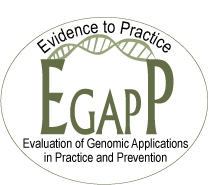Accelerating the Development of Evidence Reviews and Recommendations in Genomic Medicine
Posted on by The independent EGAPP working group (EWG) held its 26th meeting on February 11-12, 2013 at the CDC campus in Atlanta. Highlights included:
The independent EGAPP working group (EWG) held its 26th meeting on February 11-12, 2013 at the CDC campus in Atlanta. Highlights included:
- Three EWG recommendation statements on the validity and utility of genetic tests are pending publication on:
- KRAS, BRAF and other markers involved in EGFR signaling, which are used to inform choice of therapies for metastatic colorectal cancer, recently published in Genetics in Medicine;
- Genetic risk assessment for type 2 diabetes in general and high-risk populations, recently accepted to Genetics in Medicine ; and
- PCA3 testing in the diagnosis and management of prostate cancer based on an evidence review, conducted through the AHRQ Effective Health Care Program (EHC), is being finalized and prepared for peer review.
- The Knowledge Synthesis Center (KSC) presented an update on two systematic reviews: familial hypercholesterolemia and colorectal cancer screening – the latter topic is being done in conjunction with modeling by NCI /CISNET .
- The EWG heard presentations on available evidence to update two of their previous recommendations:
- Can tumor gene expression profiling improve outcomes in patients with breast cancer?; and
- Genetic testing strategies in newly diagnosed individuals with colorectal cancer aimed at reducing morbidity and mortality from Lynch syndrome in relatives. The evidence heard on this topic was to consider the addition of endometrial cancer to the overall Lynch Syndrome recommendation.
In addition to issuing recommendation statements, a central mission of the EWG is to develop and test new methods for evidence-based evaluation of genomic tests. In keeping with this aim, the KSC, along with several EWG members, have submitted a manuscript for publication in Genetics in Medicine entitled “Description and Pilot Results from a Novel Method for Evaluating Return of Incidental Findings from Next Generation Sequencing Technologies” based on methods and considerations for “binning findings from whole genome sequencing”. The manuscript has been accepted with minor revisions.
Criticisms of evidence-based processes as requiring too much time, labor and expense are all too common. The experience of the EGAPP initiative has taught us that while discovery-based knowledge and resulting hype surrounding genomic applications does evolve and accumulate quite rapidly, quality information supporting the validity and utility of using these applications in health care typically does not. To address these concerns, the past and present EWG members are in the final stages of drafting a manuscript entitled, “The EGAPP Initiative: Lessons Learned” in an effort to inform stakeholders of the possibilities and pitfalls of their efforts.
The next EGAPP Working Group meeting will be held on May 13-14, 2013.
Posted on by


